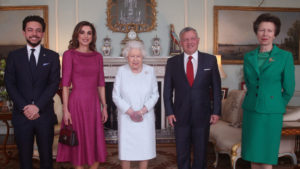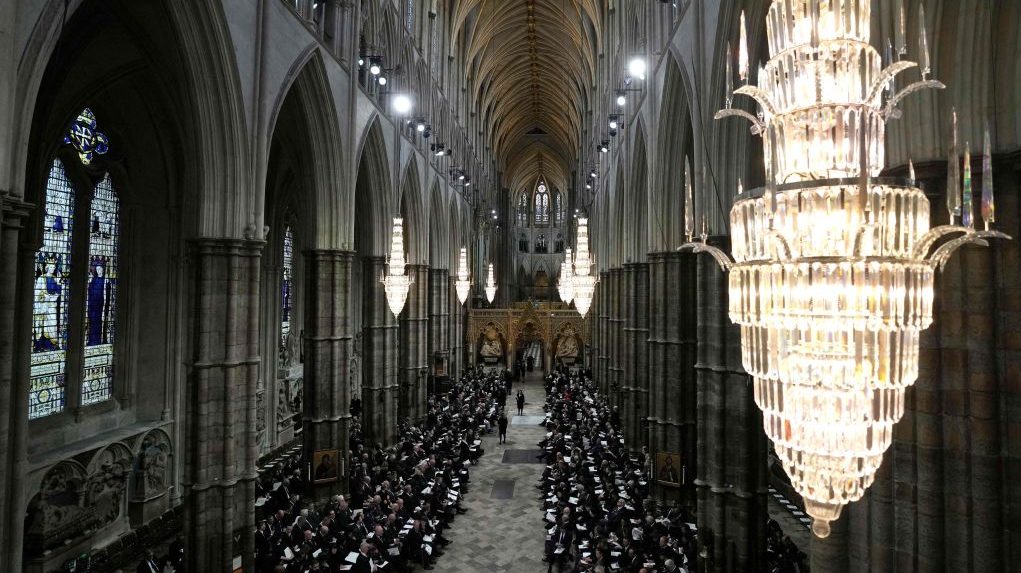World Leaders Mark End of an Era at Funeral of Queen Elizabeth
Leaders from nearly every MENA country are in London to pay respects to Britain’s longest-reigning monarch
Leaders from around the world converged on London to mark the end of an era with the funeral of Queen Elizabeth II. Some 2,000 people were set to attend the queen’s state funeral service on Monday in Westminster Abbey in London, including leaders from nearly every country in the Middle East and North Africa.
Queen Elizabeth died on September 8 at the age of 96, and after 70 years as the United Kingdom’s reigning monarch. Her coffin traveled from her home at Balmoral Castle and made stops throughout Scotland before returning to England. The queen’s body lay in state until 6:30 a.m. on Monday in Westminster Hall, with mourners waiting in lines of up to 5 km along the Thames River for up to 25 hours at its peak to pay their respects.
US President Joe Biden and his wife, Jill, arrived in London on Sunday and paid their respects in Westminster Hall. Other world leaders who visited the queen’s coffin on Sunday include Chinese Vice President Wang Qishan, French President Emmanuel Macron, and Japanese Emperor Naruhito. Israeli President Isaac Herzog and his wife, Michal, also paid their respects at the coffin on Sunday, and later the Israeli president signed a condolence book for the queen at Lancaster House in London.

Crown Prince Hussein, Queen Rania, Queen Elizabeth II, King Abdullah II and Princess Anne at Buckingham Palace, Feb. 2019 (Yui Mok/Pool/AFP via Getty Images)
“She was truly a leader that transcends time, intergenerational, she saw where the world was 70 years ago and how it is today. Her reign was truly majestic and she truly personified the word majesty,” Herzog said in a recorded condolence message in English. “In fact, she showed stability, strength, and wisdom which was radiated throughout the world.”
Give the gift of hope
We practice what we preach:
accurate, fearless journalism. But we can't do it alone.
- On the ground in Gaza, Syria, Israel, Egypt, Pakistan, and more
- Our program trained more than 100 journalists
- Calling out fake news and reporting real facts
- On the ground in Gaza, Syria, Israel, Egypt, Pakistan, and more
- Our program trained more than 100 journalists
- Calling out fake news and reporting real facts
Join us.
Support The Media Line. Save democracy.
Herzog joined world leaders, including Arab leaders, on Sunday evening at a state reception for the visitors. Among the Arab leaders in attendance were Jordan’s King Abdullah II and Queen Rania; Qatari Emir Tamim bin Hamad Al Thani; Bahrain’s King Hamad bin Isa Al Khalifa, the Sultan of Oman, Haitham bin Tarik; Sheikh Mohammed bin Rashid Al Maktoum, the prime minister and vice president of the United Arab Emirates; Kuwaiti Crown Prince Mishal Al-Ahmad Al-Jaber Al-Sabah; and Dubai’s ruler Mohammed bin Rashid Al Maktoum.
Morocco’s Crown Prince Moulay Hassan was scheduled to attend the funeral, as well as Libyan diplomat Musa al-Koni. Prime Minister Mohammed Shtayyeh will represent the Palestinian Authority at the funeral. Saudi Arabia was set to be represented by Prince Turki bin Mohammed al Saud, a Saudi cabinet member, rather than de-facto ruler Crown Prince Mohammed bin Salman, despite early speculation that MBS would attend. Lebanon’s interim Prime Minister Najib Mikati also was expected to attend the funeral.
Syria is one of six countries that was not invited to send a representative to the funeral, alongside Russia, Belarus, Myanmar, Afghanistan and Venezuela. The United Kingdom does not have diplomatic relations with Syria; in addition, the UK has supported the opposition in its civil war against the regime of Syrian President Bashar Assad.
A one-minute National Moment of Reflection was held on Sunday night at 8 p.m. A two-minute national silence will be held at the end of the funeral service at about 11:55 a.m. The royal family, including King Charles III, his siblings, and his sons Princes William and Harry, as well as William’s children Prince George – second in line to the throne, and Princess Charlotte, will walk behind the carriage carrying the queen’s coffin during funeral procession to Westminster Abbey, the site of the state funeral service. Westminster Abbey is the historic church where British monarchs have been crowned, including Queen Elizabeth’s coronation in 1953. The abbey’s bell will toll 96 times, once a minute before the funeral, one for each year of the queen’s life. It is the first British monarch’s funeral to be televised. The queen will be buried in a private service alongside her husband, Phillip, at Windsor Castle.
Queen Elizabeth took the throne in 1952, following the death of her father, King George VI, and earlier this year celebrated her platinum jubilee to mark 70 years as ruler of the United Kingdom. In 2015, Queen Elizabeth became Britain’s longest-reigning monarch, surpassing her great-great-grandmother, Queen Victoria, who ruled for 63 years.
Her final act as ruler was to invite new Prime Minister Liz Truss, whom she met at Balmoral two days before her death, to form a government in her name. As head of state for the United Kingdom and more than a dozen Commonwealth countries, the queen traveled the world extensively, including to multiple locations in the Middle East, although she never visited Israel.
The queen’s most significant visit to the Middle East came in 1979, when she spent several weeks touring the region, visiting Kuwait, Bahrain, Saudi Arabia, Qatar, the United Arab Emirates and Oman. She also made a journey to other countries in the region, including Tunisia, Algeria and Morocco in 1980 and Jordan in 1984. She visited Iran in 1961, 18 years before the Islamic Revolution.



